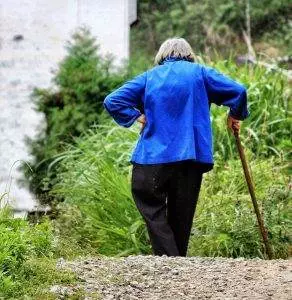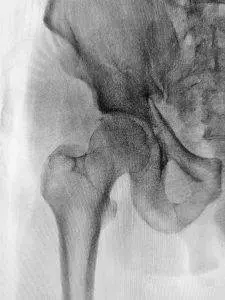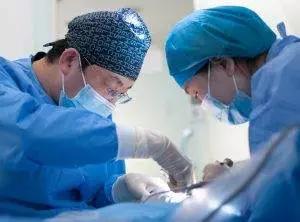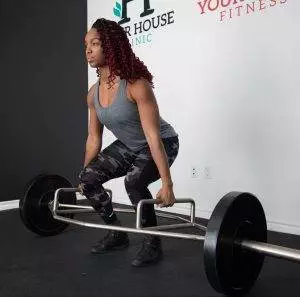By Qineng Tan, L.Ac., Ph.D. & Xiaomei Cai, L.Ac., Ph.D.

Are you suffering from hip pain symptoms like lower back and hip pain on one side, pain in buttocks shooting down leg, hip pain at night, or hip pain when walking? Several different conditions can cause pain in the hip or pain in the buttocks that radiates down the leg. It could be hip pain due to bursitis or arthritis, or related to sciatic nerve pain or piriformis syndrome. TCM and acupuncture treatment can help relieve pain in the hip, buttocks, and lower back.
The hip joint is very complex; it’s made up of a ball-and-socket bone structure with almost 30 different muscles and tendons surrounding it. Hip pain is common, especially among older adults, although people of any age can be affected by pain in the hip, buttocks, or lower back. It can be difficult to pinpoint the causes of hip pain, as there are many different possible reasons for hip pain, and the aching sensation can move from place to place, or suddenly become more intense. The hip pain location, the quality of the pain, and when it happens can tell us a lot about what is causing pain in the buttock or hip area, so it is important to pay close attention to the type of hip pain. For example, is it sudden hip pain? Hip pain gets worse at night? Is the hip pain worse after sitting for long periods?
What does arthritis in the hip pain feel like? Hip pain that develops slowly over a period of time may be due to osteoarthritis. Other signs of osteoarthritis of the hip include:
- Hip pain worse in the morning, feel better after moving around.
- Grinding sensation, ache, stiffness, soreness, sometimes, hip feels locked up.
- Hip pain that gets worse when start to exercise, but usually gets better once warm up, and worse again after excessive exercise.
- Pain that goes from the hip down to the knee or across the back
This is the type of arthritic hip pain that comes on with age and many years of use, as the cartilage that cushions the hip joint wears down over time. Osteoarthritis of the hip can be more painful when it rains. Left untreated, hip osteoarthritis can cause people to lose mobility and even walk with a limp.
Sharp hip pain or tenderness when you lie on your side or sit down may be due to hip bursitis.
- Hip pain worse at night
- Hip pain stiff when getting up
- Difficulty walking, hard to squat or sit
- General ache all over the back, groin, hip area
Bursitis is inflammation of the small, fluid-filled sacs that provide cushioning around large joints like the hip. The outer part of the hip bone is topped by the trochanteric bursa; when this bursa becomes inflamed, due to a bump or fall, overuse, or some other injury, it can cause pain on the outside of the hip or buttock area.
Gradually worsening hip pain, or feeling stiff and sore in the morning can be a sign of hip flexor tendonitis or tendinitis of the hip. This is caused by inflammation of the tendons and connective tissues in the hip, usually due to high intensity sports activities.
A shooting pain that seems to radiate down from the hip to the leg and even the foot is often a sign of sciatica, a kind of nerve pain. The sciatic nerves extend from the lower spine and branch out into the buttocks and down the legs. When the sciatic nerve is compressed, it can cause numbness, tingling, pins and needles, or radiating pain to shoot from the buttock down one leg. Other sciatica symptoms can include:
- intermittent pain that comes and goes
- weakness in one leg
- sharp pain that feels like a jolt
- burning pain in buttock, burning pain in one leg
- pain that is worse when bending or standing
Sciatic pain can happen due to impingement or a pinched nerve from a herniated disk in the lower spine (lumbar herniated disk), or other spinal problems like spinal stenosis (narrowing of the spine that compresses nerves) or spondylolisthesis (slipped disc).
Radiating pain in the buttock that is similar to sciatic pain can also be caused by problems with the soft tissues of the buttock, especially the piriformis muscle. Inflammation, spasms, or tightness in the piriformis muscle can cause compression of the sciatic nerve, which runs just underneath, or in some cases, through the piriformis. This condition is known as piriformis syndrome.

Moderate hip pain is usually treated with medications and/or injections to relieve pain and reduce inflammation, along with perhaps a referral to physical therapy (PT) to help strengthen the muscles of the hip. Severe hip pain that persists beyond treatment with PT and medication may lead to surgery as a last resort. In many cases, TCM methods including acupuncture can help relieve the pain and inflammation of osteoarthritis, sciatica, bursitis, tendonitis, and other causes of hip pain, without the side effects of medications or complications of hip surgery.
Top 10 Hip Pain Causes
Pain in the hip and buttock on one side, pain in the butt, or hip pain can be related to one or more of a variety of conditions affecting the hip joint, the lumbar spine, or the soft tissues of the hip and buttock area. Causes of hip pain can include:
- Arthritis hip pain or Osteoarthritis of the hip – arthritis is a general term for joint pain. Pain in the hip joint can occur due to constant wear-and-tear over the course of many years, leading to inflammation in the hip joint and the breakdown of cartilage.
- Bursitis outer hip pain – swelling and inflammation of the hip bursae
- Sciatica in hip – nerve pain due to compression of the sciatic nerve
- Piriformis syndrome – inflamed or tight muscles in the buttocks compress the sciatic nerve, causing pain or numbness in the buttock, hip, and leg
- Hip Tendonitis – trauma or use injury to the connective tissues of the hip joint
- Sacroiliac joint pain or SI joint pain – the sacroiliac joints connect the hip bones to the lower spine and tailbone. This joint is designed to move subtly; too much or too little movement can cause dysfunction and pain across the low back and hips. It is fairly common for women to experience some SI joint pain (and also sciatica) during pregnancy.
- Muscle strain – if one of the large muscles that makes up the hip joint is stretched past its usual range of motion, hip strain can cause pain and swelling. This can happen during normal daily activities, but most often happens during sports or exercise, possibly if someone has not warmed up adequately.
- Hip dysplasia or Dislocated hip – some people are born with anatomical abnormalities of the hip joint, when the socket part of the joint doesn’t fully fit around the ball part. This can lead to instability in the hip, dislocation of the hip, damage to cartilage, pain in the groin and hip, and higher risk of osteoarthritis.
- Hip fracture – fractures in the hip are common among older people, women especially. A hairline hip fracture or broken hip may cause a vague pain in the lower back, pain in groin, or pain down the leg or knee pain. Hip fractures can lead to other serious problems, like blood clots, infections like UTIs, or pneumonia.
- Hip Labral Tear – a labrum is a piece of cartilage that absorbs shock and helps the functioning of the major joints of the body in various ways. You may have heard of a labral tear in the shoulder that causes shoulder pain; hip labral tear is similar. This could mean overall degeneration of the cartilage, or the labrum becoming detached from the bone, or the formation of a cyst around the area. Injury to the labrum of the hip can cause pain deep in the groin.
How Is Hip Pain Treated?
Hip pain is usually treated initially with anti-inflammatory pain relief medications like NSAIDs. Cortisone injections may also be recommended for conditions like bursitis or hip tendonitis. While cortisone shots for hip pain may help relieve pain in the short-term, repeated injections can cause damage to the area. Cortisone can also raise blood sugar levels, which can be dangerous for people who have diabetes or are at risk for diabetes or metabolic syndrome.

Arthroscopic surgical techniques allow orthopedic surgeons to operate on the hip joint in a minimally-invasive way. This may be done to repair a torn labrum or remove loose cartilage. More complex surgery may be indicated to repair hip dysplasia or serious degeneration due to osteoarthritis. Hip replacement surgery is becoming more common, with over 450,000 total hip replacements currently being performed each year in the U.S. While many people are able to get relief from chronic hip pain through hip replacement, it is a major decision, and there are significant risks involved, including: infections, fractures that occur during the surgery, nerve damage, etc. The risk of blood clots after a hip replacement necessitates taking blood thinners. Even under the best circumstances, the prosthetics that are implanted during a hip replacement do not last forever, and some people may have to have a second operation to replace the replacement.
Acupuncture treatment can help to reduce inflammation and alleviate pain in the hip due to osteoarthritis and other complaints, without the risks of long-term pain medication use.
Can Acupuncture Help Hip Pain?
According to TCM theory, arthritis of the hip is considered a Bi Syndrome, a condition in which stagnation of blood and Qi (life force energy) causes pain and stiffness in the muscles and joints. Cold, wind, and heat are pathogenic factors that cause the blockage of energy moving freely through parts of the body. Imbalances in the organs, such as the kidneys, gallbladder, spleen, and stomach can also contribute to Bi Syndrome hip pain. Standard approaches that seek to alleviate pain do not help treat the problem at the source. A TCM practitioner can address the root source of the blockage and pain with acupuncture and herbal supplementation.
Sciatica nerve pain that affects the buttock, hip, and leg is also considered to be a Bi Syndrome condition, and is due to obstructions in the flow of Qi through the gallbladder and bladder meridians. Acupuncture treatment helps relieve nerve pain by acting as an analgesic, reducing pain signals and increasing the production of endorphins in the body, while reducing inflammation in the surrounding tissues and helping the nerves to heal.
One study of patients suffering sciatic pain who were treated with TCM found that acupuncture alone had an 81.6% efficacy rate for reducing pain symptoms, while acupuncture combined with herbs was 95% effective. A follow-up with patients who had been treated with acupuncture for sciatica related to herniated disc showed that people had experienced long-term positive results.
Tendonitis of the hip and hip bursitis are inflammatory conditions that can also be helped with acupuncture and herbs. A review of acupuncture treatment for pain related to herniated disc concluded that TCM methods worked better than pain medication or traction therapy.
An experienced TCM practitioner will also be able to help you with making changes in your diet and exercise programs that will reduce inflammation while strengthening both your Qi and the muscles of your lower back and hip joints.
Top 5 Tips for Hip Pain

Here are some steps you can take to get rid of hip pain and prevent it from coming back, in addition to getting acupuncture treatment and taking Chinese herbs:
- If lower back pain and hip pain is due to sciatic nerve pain, pinched nerves, or disc problems/herniated disk, it is still important to keep moving your body. Too much time in bed can actually do more harm than good. When exercising, be sure to warm up adequately. Take things slowly, and listen to your body. Vary your exercise to include gentle movement modalities like Tai Qi, which emphasize rotation of the joints. Strength training, working out with weights, is also great to strengthen the major muscle groups that support the back and hips.
- Some conditions, such as a hip labral tear, muscle strain in the hip, or fractured hip, may require rest to heal. It can be difficult to take time out for healing in our modern fast-paced culture, but do your best to use this time to rest well, work on a meditation practice, and make your health your top priority.
- Don’t keep your phone or wallet in your back pocket. This creates imbalance and puts pressure on one side of the hip and pelvis.
- Be sure that your sleeping position helps to reduce stress on the lower back. Using a bolster under your knees may help. Mattresses should be medium-firm.
- Weight management, or losing weight, can help to take a lot of stress off of the joints. An anti-inflammatory diet (avoid spicy foods, and nightshade vegetables: tomatoes, potatoes, peppers, eggplant) will also help.
Acupuncture Near Me for Hip Pain
Hip pain is not something to ignore. Healthy hip joints are vital to continued mobility and quality of life. Sadly, it is well-known that a fractured hip often means the end of an active life for an older person. It doesn’t have to be this way. If you or someone you love is noticing hip pain interfering with life, it may be the time to treat hip pain with acupuncture and herbs. Adding an acupuncturist to your healthcare team for integrative care can make all the difference.
*This article is for education from the perspective of Traditional Chinese Medicine only. The education provided by this article is not approved by FDA to diagnose, prevent, treat and cure human diseases. It should not stop you from consulting with your physician for your medical conditions. Traditional Chinese Medicine is based on Qi, which is an invisible force that usually cannot be observed by modern science. Because science focuses on testing ideas about the natural world with evidence obtained through observation, these aspects of acupuncture can’t be studied by science. Therefore acupuncture and Chinese herbs are often not supported by double-blind, randomized trials, and they are considered alternative medicine therapies in the United States.
